Full page photo print - Harvard Law School Project on Disability
Full page photo print - Harvard Law School Project on Disability
Full page photo print - Harvard Law School Project on Disability
Create successful ePaper yourself
Turn your PDF publications into a flip-book with our unique Google optimized e-Paper software.
sexual ViOlenCe, explOitatiOn, and abuse<br />
Studies indicate that sexual exploitati<strong>on</strong> and abuse is a widespread phenomen<strong>on</strong> am<strong>on</strong>g<br />
pers<strong>on</strong>s with disabilities, particularly women and girls, although disabled men and boys also<br />
experience sexual violence, exploitati<strong>on</strong>, and abuse. Studies indicate that nearly 50% of<br />
women with disabilities report some form of sexual abuse during their childhood and some 30%<br />
of disabled women report being subjected to sexual abuse in their adult lives. 20 Most instances<br />
of abuse go unreported and, therefore, remain unaddressed. Very often, abuse takes place<br />
in a private home dwelling or in an instituti<strong>on</strong> where it is sometimes imagined that people with<br />
disabilities will be free from abuse.<br />
Sexual violence, exploitati<strong>on</strong> and abuse have l<strong>on</strong>g-lasting harmful effects <strong>on</strong> pers<strong>on</strong>s with<br />
disabilities. Where such abuses occur in isolated settings, the chances of accessing the<br />
assistance needed for recovery may be slim. Moreover, such traumatic experiences may<br />
increase disability-related functi<strong>on</strong>al limitati<strong>on</strong>s or create sec<strong>on</strong>dary disabilities. Programs<br />
and services that do address sexual violence and abuse in the community, particularly those<br />
targeting women and girls, very often do not reach out to disabled pers<strong>on</strong>s. <strong>Disability</strong> advocates<br />
are working to address these gaps and to ensure that programs and services are inclusive and<br />
accommodating to all. Violence preventi<strong>on</strong> advocacy is an important comp<strong>on</strong>ent of ensuring<br />
the right of pers<strong>on</strong>s with disabilities to be free from violence and to lead self-determined lives.<br />
exerCise 6.4: making a Commitment to promote freedom from<br />
torture and other forms of Violence and abuse<br />
Emphasize that human rights involve both rights and resp<strong>on</strong>sibilities.<br />
• Ask if after learning about the human right of people with disabilities to be free from torture<br />
and other forms of violence and abuse, the groups are ready to think about taking c<strong>on</strong>crete<br />
acti<strong>on</strong>.<br />
• Acknowledge that although there is still much planning and informati<strong>on</strong> gathering to do,<br />
commitment to creating change is also very important.<br />
• Explain that you would like to ask each participant to name <strong>on</strong>e individual acti<strong>on</strong>, however<br />
small, that she or he is willing and able to take in the next m<strong>on</strong>th to promote the human right<br />
of people with disability to be free from torture and other kinds of violence and abuse.<br />
To plan advocacy for the human rights of people with disabilities, see Part 3, “Advocacy! Taking<br />
Acti<strong>on</strong> for the Human Rights of People with Disabilities,” p. 229.<br />
useful resOurCes On tOrture and Other fOrms Of abuse<br />
against persOns with disabilities<br />
• Human Rights Watch, Ill Equipped: U.S. Pris<strong>on</strong>s and Offenders with Mental Illness<br />
(2003): http://www.hrw.org/reports/2003/usa1003<br />
• Mental <strong>Disability</strong> Advocacy Center: http://www.mdac.info/index.html<br />
• Mental <strong>Disability</strong> Rights Internati<strong>on</strong>al: http://www.mdri.org<br />
• World Institute <strong>on</strong> <strong>Disability</strong>, The Impact of Violence <strong>on</strong> People with Disabilities (Marsha<br />
Saxt<strong>on</strong>, 2006): http://www.wid.org<br />
20 “The Impact of Violence <strong>on</strong> People with Disabilities.” 2006. World Institute <strong>on</strong> <strong>Disability</strong> (Marsha Saxt<strong>on</strong>).<br />
part 2: the COnVentiOn On the rights Of persOns with disabilities<br />
95




